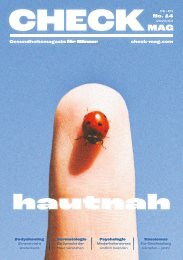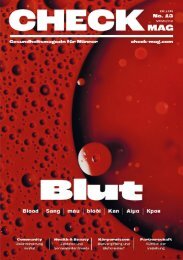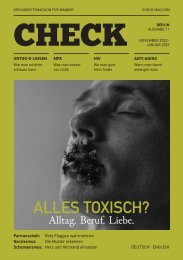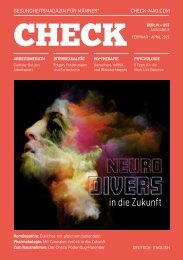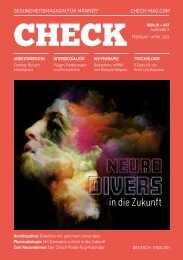CHECK Magazin - Gesundheitsmagazin für Männer No.9
Alkoholmissbrauch und dessen Folgen sind die zweithäufigste Ursache für Krankenhausbehandlungen in Deutschland. Mehr als 150 internistische, neurologische und psychiatrische Diagnosen werden mit Alkoholmissbrauch assoziiert. Doch eine Gruppe fällt beim Thema Alkoholkonsum besonders auf: Queere Menschen, darunter insbesondere schwule und bisexuelle Männer.
Alkoholmissbrauch und dessen Folgen sind die zweithäufigste Ursache für Krankenhausbehandlungen in Deutschland. Mehr als 150 internistische, neurologische und psychiatrische Diagnosen werden mit Alkoholmissbrauch assoziiert. Doch eine Gruppe fällt beim Thema Alkoholkonsum besonders auf: Queere Menschen, darunter insbesondere schwule und bisexuelle Männer.
Erfolgreiche ePaper selbst erstellen
Machen Sie aus Ihren PDF Publikationen ein blätterbares Flipbook mit unserer einzigartigen Google optimierten e-Paper Software.
Community<br />
ESCAPISM AND ESCALATION<br />
Whoever is out and about on the scene will<br />
quickly think of someone who might not only<br />
have a problem with alcohol, but other substances<br />
too. Alcohol and drugs are rife and,<br />
for some, have become part of the gay lifestyle.<br />
Loneliness, social anxiety and the desire<br />
to belong promote this. We have a problem<br />
– but why is nobody talking about it?<br />
Not only is the internalised shame great, but<br />
so is the danger of further stigmatisation.<br />
In addition, men generally use psychiatric,<br />
psychotherapeutic and outpatient medical<br />
services less often and tend to lack self-care.<br />
Network studies show that they also have<br />
fewer contacts for problems than women,<br />
who tend to live in larger, more diverse social<br />
networks.<br />
Classic role models of strength,<br />
dominance, emotional suppression<br />
as well as carelessness and<br />
hardness promote addictions.<br />
Mental illnesses are often still seen as a<br />
weakness, which is why men in particular<br />
often try to hide mental problems. For the<br />
most part, only the physical symptoms such<br />
as liver cirrhosis or cancer are treated, but<br />
not the mental illness. Classic role models of<br />
strength, dominance, suppression of feelings<br />
as well as carelessness and harshness not<br />
only towards others, but also towards themselves<br />
and their bodies can lead to a high<br />
level of psychological strain and health problems<br />
in men and promote addiction. Added to<br />
this is the greater willingness to take risks in<br />
adolescence and the greater risk of becoming<br />
dependent the earlier you start drinking.<br />
Peer pressure about substance use isn't just<br />
a problem for straight boys. Adolescents are<br />
particularly vulnerable to attempts to numb<br />
emotions and experiences if they also suffer<br />
from insecurities and possible self-esteem<br />
problems because of their sexuality and do<br />
not receive support for dealing with negative<br />
emotions or traumatic experiences in a<br />
healthy way.<br />
IT'S OK AS LONG AS YOU FUNCTION!<br />
But pressure to conform is also a risk factor<br />
in adults. Drinking is part of normality –<br />
especially among men – and is usually not<br />
questioned as long as we function socially<br />
and professionally. Alcohol is socially accepted<br />
and firmly established as a drug and is<br />
available anytime and anywhere. It is widely<br />
used to reduce stress, even if it only provides<br />
relaxation and exuberance in the short term<br />
and the negative effects outweigh the positive<br />
effects in the long term. Although alcoholics<br />
cannot be stereotyped as they exist in all<br />
walks of life and professions, from adolescence<br />
to retirement age, stereotypical images<br />
of (heterosexual) unemployed or homeless<br />
alcoholics obscure a widespread disease.<br />
In addition, the image of a colorful rainbow<br />
world is created in the media, in which there<br />
is no longer any discrimination or problems.<br />
Politically, there is little interest in addressing<br />
other LGBTI* issues. There is a lack of<br />
German studies on the specific problems<br />
faced by gay men and sexual minorities, and<br />
above all there is a lack of innovative, target<br />
group- specific and effective prevention and<br />
treatment concepts.<br />
The image of a colorful<br />
rainbow world is created in<br />
the media, in which there is<br />
no longer any discrimination<br />
or problems.<br />
As a society, we can all do our part to ensure<br />
that LGBTI* people will hopefully experience<br />
less or no discrimination and stigma as well<br />
as a supportive environment that is no longer<br />
negatively impacting their health. Reality<br />
shouldn't be so hard for anyone to endure<br />
62 <strong>CHECK</strong> BERLIN #9










